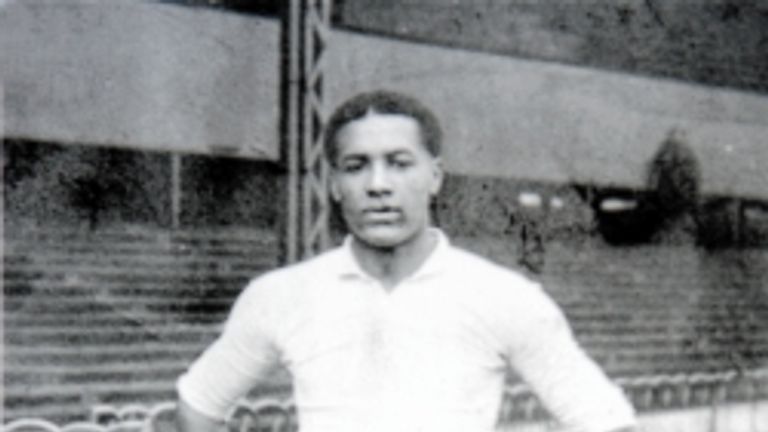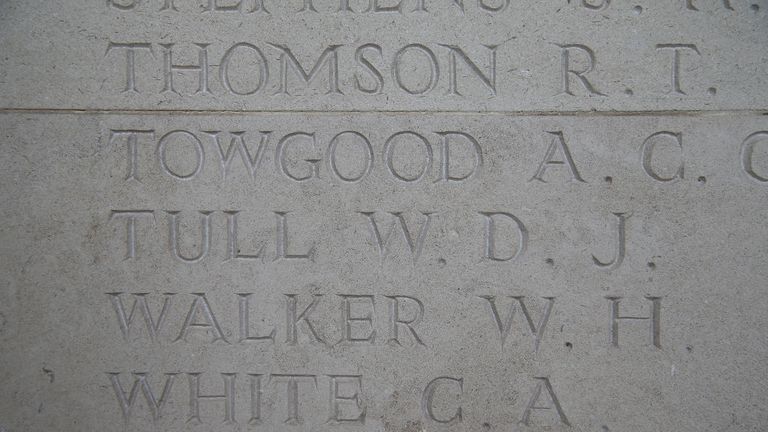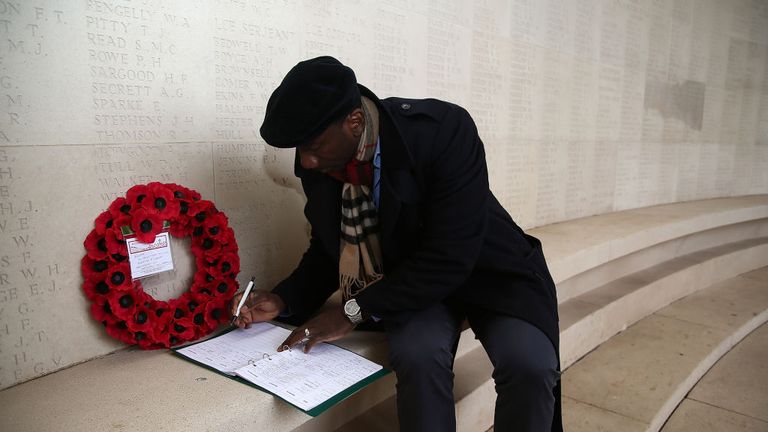Tottenham urged to honour Walter Tull's memory by naming stand after pioneer
On 100th anniversary of the death of Walter Tull, the club's first black player, Spurs encouraged to 'promote his story'; Tull was also the first black officer to serve in the British Army, with group of MPs calling for posthumous military cross
Friday 23 March 2018 18:07, UK
Tottenham have been urged to name a stand at their new stadium after the club's first black player, Walter Tull.
That is the view of historian and biographer Phil Vasili, and actor Nicholas Bailey, who plays Tull in a newly-devised one-man show called Walter Tull: Hero Remembered.
Tull played for amateur side Clapton, before joining Spurs and later moving to Northampton. He joined the British Army in December 1914 and would go on to become the first black infantry officer.
A crossbench group of MPs - led by Tottenham MP David Lammy - are calling for Tull to be posthumously awarded a military cross, and Vasili believes British football should also look to commemorate his role as a trailblazer in the game.
Vasili told Sky Sports News: "Northampton have got a statue but I think it would be wonderful, lovely, to name a stand after Walter Tull and to actually carry on and do work in the community that promotes Walter's story.
"A statue would be great but I think a stand would be better, because he will be looking down on the field that he should have played at for the majority of his career.
"Tottenham should be really proud of Walter and to their credit, they took him on at a time when a lot of clubs wouldn't sign black players. They should be really proud of that history and I would say to Tottenham they should stand proud and get behind Walter's story."
Tull faced adversity after becoming an orphan at the age of seven. Vasili explained it was at the Bethnal Green orphanage where he was raised that Tull fulfilled his sporting potential, leading to him becoming Tottenham's first black player.
"Walter played football for the orphanage he was in and they gave Walter a platform to learn football and learn cricket," he said.
"Clapton was a big amateur team and at that time there was not such a division between amateur and professional football.
"He joined Clapton in October 1908 and helped them win the FA Amateur Cup, the London Junior Cup and the London Senior Cup - he never played on a losing side. That's when Spurs noticed him.
"Amazingly his first matches for Spurs in 1909 were in Argentina and Uruguay on a summer tour. Spurs had just earned promotion and so his competitive debut for Spurs actually came in the club's very first game in the top flight, which was a 3-1 loss at Sunderland.
"His home debut was against Manchester United and he was brought down for the penalty which resulted in Spurs' equaliser in a 2-2 draw. It was an exciting start to his career but he got serious racist abuse at a match in Bristol a month later.
"It was so bad and that frightened Spurs. It led to him being signed by a former Spurs player, Northampton boss Herbert Chapman [who would later earn legendary status at Arsenal].
"Walter seemed content and really happy at Northampton but then the war came along and he joined the army. He carried on playing in the 1914-15 season before he was called up fight in France."
Bailey, who played the role of Dr Anthony Trueman in the BBC soap Eastenders, hopes future generations can be inspired by Tull's achievements.
"It is such a privilege and an honour to play this role," he said. "I've played many different roles and after 25 years as a performer - this is it (this is everything) for me.
"As an actor and a performer, I'm drawn to stories and after getting in touch with Spurs and Northampton I contacted Phil in the late Nineties because I wanted to turn this into a movie.
"I was inspired from the get-go and I just felt I could find a perspective to get under his skin and investigate who he might have been because what he went through resonated with me.
"The production is an exploration of his psychological past. There were so many forces at work within him right from the age of seven when his mother died, and later, during the war, he suffered from PTSD (Post Traumatic Stress Disorder).
"He dealt with so much but there is not a single reference of him losing his rag or letting himself down. It was always positive, so I wanted to explore what makes a hero and what made the man.
"But ultimately I want people to be inspired by him and I want the next generation to take possession of his legacy because it belongs to the whole nation.
"No child should be leaving the British education system without having a good knowledge of Walter's life, legacy and achievements and knowing what it means for them."








